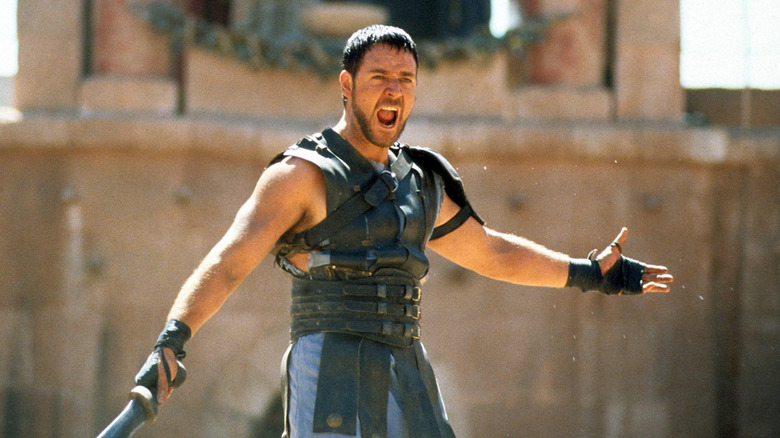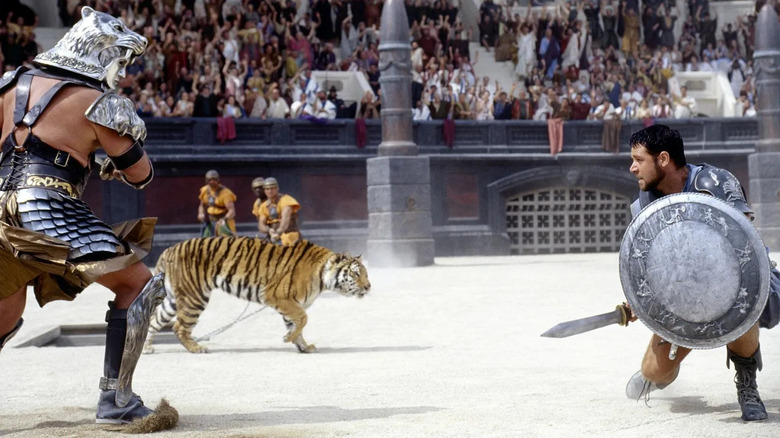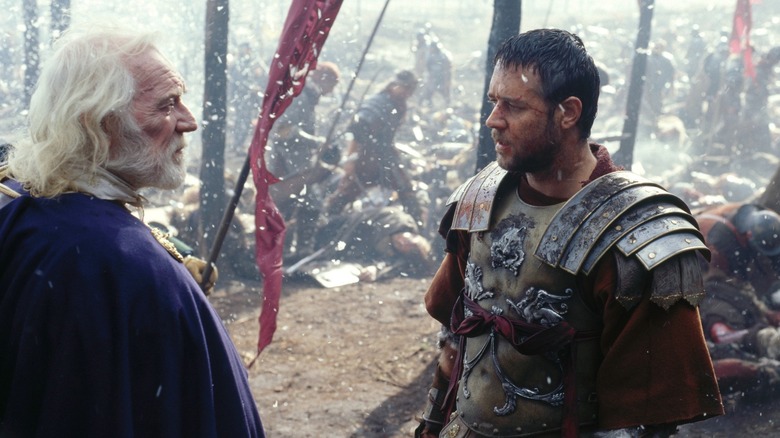Is Russell Crowe's Gladiator Based On A True Story?
"Gladiator" is a Ridley Scott classic that blew the box office away when it released in the summer of 2000. Scott recently returned to the Roman saga with a sequel, "Gladiator II," that stars Paul Mescal and a scene-stealing Denzel Washington. While the "Gladiator" franchise is a fixture of cinema, though, one common question is whether it's based on a historical true story, or whether it's mere fiction. In the case of Russell Crowe's titular Gladiator," in particular, is Maximus' harrowing tale a bona fide reality, or is it made up of whole cloth?
The short answer is that it's mostly the latter. "Gladiator" is not based on a true story, and neither is its sequel. However, this is tricky answer because Scott did borrow heavily from real history to create his story. (Kind of like how the completely made-up assassination of Hitler is joyously included in "Inglourious Bastards," but it doesn't change the fact that the movie is full of historical resonances.)
It's true that certain characters in "Gladiator," like Maximus, are made up for the story. But there is a plethora of characters in both movies who are all lifted directly from the historical record. Individuals like Marcus Aurelius (Richard Harris), Commodus (Joaquin Phoenix), Macrinus (Denzel Washington), Geta (Joseph Quinn), and Caracalla (Fred Hechinger) were all real people in history. It's their actions and the story they're situatued in that are made up.
Real-life inspirations for Gladiator
Things get even more complicated when you look at how the larger storyline of "Gladiator" actually dances with the truth. Marcus Aurelius really did live to an old age and was constantly fighting Germans on the Roman borders. Commodus did take over after him and proceeded to rule as an absolute tyrant. However, as the movie progresses, there are some major deviations. For instance, there's no evidence that Commodus killed his father. Similarly, Marcus Aurelius was a wise, philosophical old emperor, but he didn't go so far as to try to restore the Roman Republic. By all accounts, he chose Commodus as his heir. Still, the inspiration is clearly there. Ridley Scott simply took the concept of artistic license very literally in telling his tale. ("Gladiator 2" also has close connections to historical reality, albeit in the midst of major fictional elements.)
One of the best examples of a fictional character who draws heavily on historical reality is Senator Gracchus. Played by Derek Jacobi, the politician stands out in the film as a trusted ally in a den of snakes. Throughout the movie he works behind the scenes to help the heroes, and at the end he's given the responsibility of guiding Rome back to a republic. Though the character was invented for the film, Gracchus is clearly inspired by a pair of senators much earlier in Roman history: the populists Tiberius and Gaius Gracchus. Along with sharing a name, both the real and fictional members of this Gracchi trio were individuals who subverted the system and worked to help the people (albeit in very different ways).
Unlike his movie counterpart, the real Commodus actually loved to fight in the arena, but he didn't die there. He was poisoned by his concubine, Marcia, as part of an assassination plot. Then, when the poison failed to finish him off, the conspirators sent Commodus' personal trainer, a wrestler called Narcissus, to strangle him while he was taking a bath. At a stretch, he was killed by a gladiator — but not the gladiator depicted in the movie.
Was Maximus a real character?
While characters like Commodus and Gracchus have interesting historical resonances, the most fascinating one of all is Maximus. Russell Crowe's character is completely made up for the movie. There was no Spanish general who grew up near the royal household, lost his family, became a gladiator, and killed Commodus in the arena. That is pure epic storytelling from Ridley Scott's endlessly inspired imagination. However, there are some very real Roman individuals who likely influenced parts of Maximus's character.
One of those is Marcus Nonius Macrinus, the historical version of Denzel Washington's character in "Gladiator II," who was a statesman, general, and advisor to Marcus Aurelius. Another candidate is Avidius Cassius, yet another of Aurelius' generals who nearly took over instead of Commodus, though not with his emperor's blessing. The connections keep coming. Magnus Maximus was a Spaniard of humble origins who became emperor later in Roman history. Diocletian was a famous emperor who began as the emperor's bodyguard and eventually introduced revolutionary political reforms.
Probably the best one of all is Tiberius Claudius Pompeianus (good luck pronouncing that one), a fella who led Roman troops against the Germans under Marcus Aurelius. Get this: Pompeianus married the emperor's daughter Lucilla (played by Connie Nielsen in the film) and was supposed to serve as Commodus' advisor when he became emperor. However, he had to step out of the limelight when it got out that his wife was involved in a plot against her brother. At multiple points in his life, he's even offered the crown.
See why it's hard to peg this one as pure fiction? Yes, the overall story of Maximus the Spaniard is made up for the silver screen. You can't even say it's embellished or exaggerated. Both Maximus and the "Gladiator" story are too far afield to connect to any one individual. But many of the characters are inspired by and occasionally pulled right from reality, as are the larger historical story strokes.


